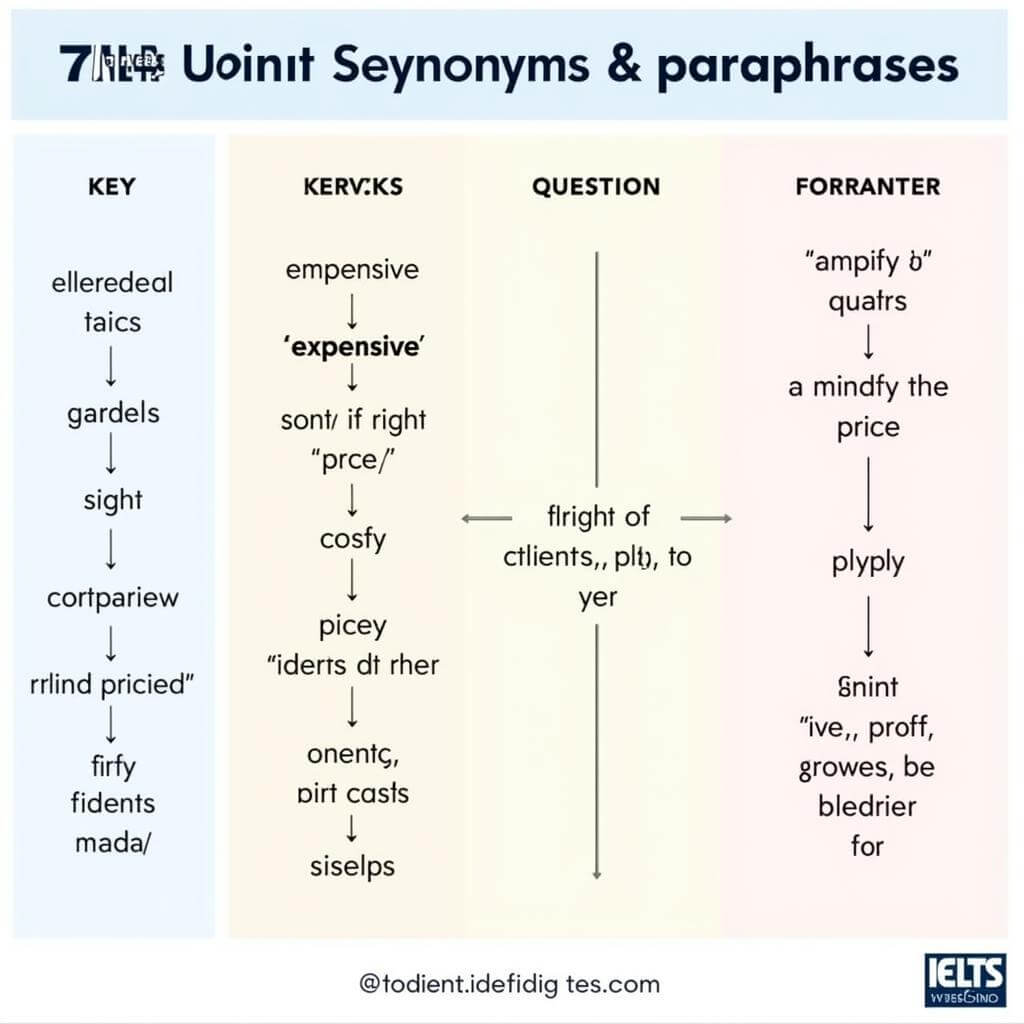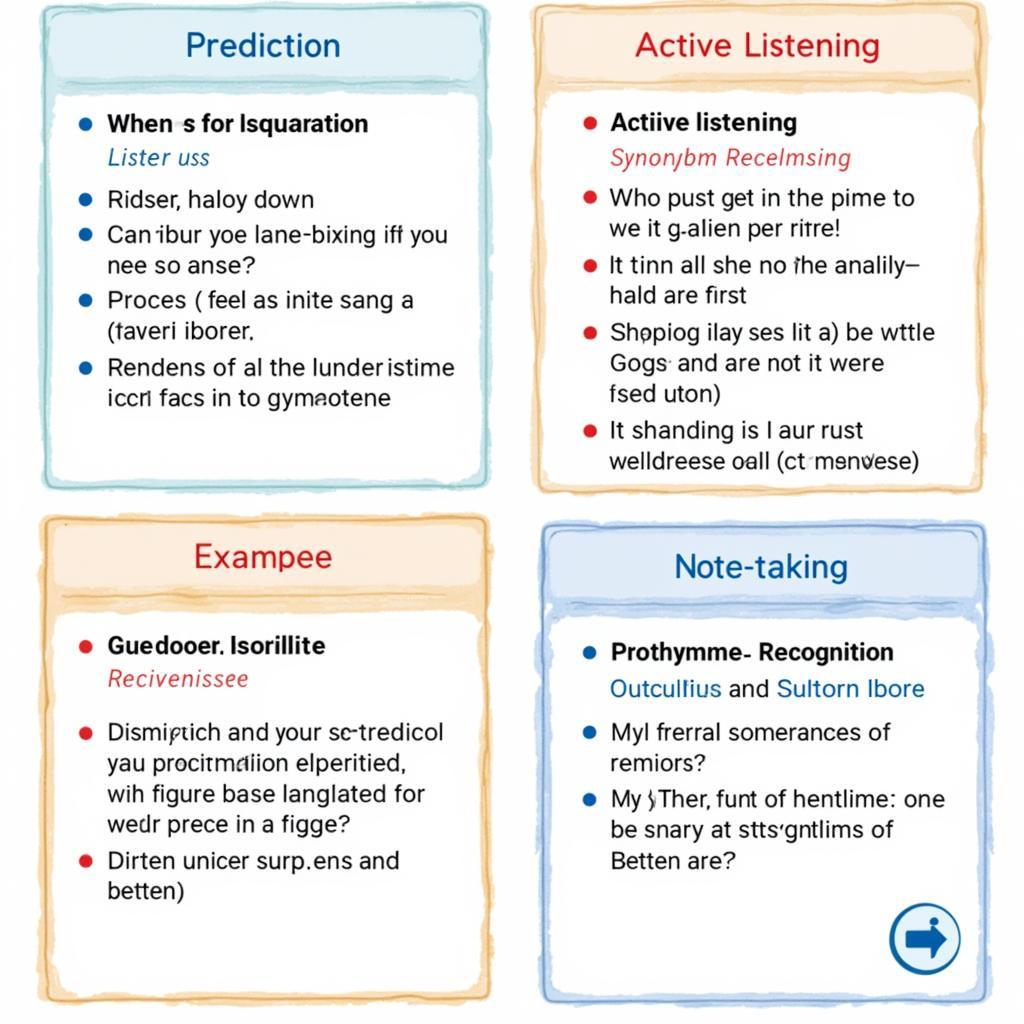Are you looking to boost your performance in the IELTS Listening test? Short answer questions can be particularly challenging, but with the right strategies, you can significantly improve your score. As an experienced IELTS instructor, I’ll share proven techniques to help you tackle these questions with confidence.
Understanding Short Answer Questions
Short answer questions in IELTS Listening require you to write brief responses, usually one to three words. These questions test your ability to identify specific information and key details from the audio. Let’s explore some effective strategies to enhance your performance in this question type.
The Importance of Prediction
One of the most crucial skills for handling fast talkers in listening is prediction. Before the audio begins, carefully read the questions and try to anticipate the type of information you’ll need to listen for.
- Look for clues in the question stem
- Identify key words that might be synonyms or paraphrases in the audio
- Consider the grammatical form required (e.g., noun, verb, number)
By predicting effectively, you’ll be better prepared to catch the relevant information when it’s spoken.
Key Strategies for Short Answer Success
1. Focus on Question Words
Pay close attention to question words like “who,” “what,” “where,” “when,” “why,” and “how.” These words indicate the type of information you should be listening for.
- “Who” suggests you’ll need to identify a person or organization
- “Where” indicates a place or location
- “When” requires a time or date
Understanding these cues will help you filter the audio and focus on the most relevant details.
2. Listen for Synonyms and Paraphrases
IELTS often uses synonyms or paraphrases in the audio, rather than the exact words from the question. To excel in short answer questions, you need to:
- Expand your vocabulary
- Practice identifying synonyms
- Be prepared for different ways of expressing the same idea
For example, if the question asks about “cost,” the audio might use words like “price,” “fee,” or “charge.”
 IELTS Listening Synonyms and Paraphrases
IELTS Listening Synonyms and Paraphrases
3. Develop Effective Note-Taking Techniques
Quick and efficient note-taking is crucial for boosting retention during listening. Here are some tips:
- Use abbreviations and symbols
- Write down key words, not full sentences
- Focus on numbers, dates, and proper nouns
- Create a personal shorthand system
Remember, your notes are just for you, so develop a system that works best for your learning style.
4. Practice Active Listening
Active listening involves fully concentrating, understanding, and responding to what you hear. To improve your active listening skills:
- Stay focused throughout the audio
- Visualize the information being described
- Mentally summarize key points as you listen
By engaging actively with the content, you’re more likely to catch and retain the necessary information for short answer questions.
Common Pitfalls and How to Avoid Them
Spelling Mistakes
Incorrect spelling can cost you valuable points. To minimize spelling errors:
- Practice spelling commonly misspelled words
- If unsure, try writing the word in different ways and choose the one that looks most familiar
- Pay attention to British vs. American spelling variations
Exceeding Word Limits
Always adhere to the word limit specified in the instructions. If the question asks for “NO MORE THAN TWO WORDS,” writing three words will result in a wrong answer, even if the information is correct.
Missing Key Information
Sometimes, test-takers focus so intently on one part of the audio that they miss crucial information. To avoid this:
- Stay alert throughout the entire recording
- Don’t fixate on difficult words or phrases
- If you miss something, move on and stay focused on the next question
Advanced Techniques for High Scorers
If you’re aiming for a top score, consider these advanced strategies:
1. Anticipate Distractors
IELTS often includes “distractors” – information that seems relevant but isn’t the correct answer. Train yourself to distinguish between relevant information and distractors by:
- Listening for corrections or changes in the speaker’s statement
- Paying attention to qualifying words like “however,” “but,” or “actually”
2. Utilize the Repeat
In the actual test, you’ll hear the audio only once. However, in your practice:
- Listen to the audio multiple times
- Focus on different aspects each time (e.g., main ideas, specific details, intonation)
- Analyze why you missed certain answers
This technique will sharpen your listening skills and help you build listening comprehension speed.
3. Contextual Understanding
Develop a broader understanding of the context to better anticipate and interpret information:
- Pay attention to the speaker’s tone and attitude
- Consider the overall topic and how individual pieces of information fit into it
- Use your general knowledge to make educated guesses when necessary
Dr. Emma Thompson, a renowned IELTS expert, emphasizes:
“Success in IELTS Listening isn’t just about hearing words; it’s about understanding context and quickly processing information. Developing these skills takes practice, but it’s the key to mastering short answer questions.”
 IELTS Listening Short Answer Question Strategies
IELTS Listening Short Answer Question Strategies
Practice Techniques to Improve Your Skills
To effectively improve your performance in short answer questions, incorporate these practice techniques:
- Use official IELTS practice materials
- Listen to English podcasts and practice summarizing key points
- Watch English news broadcasts and try to answer “who,” “what,” “where,” “when,” and “why” for each story
- Practice with a study partner, taking turns reading passages and answering questions
- Record yourself answering questions and analyze your responses
Consistent practice using these methods will significantly enhance your ability to handle short answer questions in the IELTS Listening test.
Adapting to Different Accents
IELTS Listening tests feature a variety of English accents, which can be challenging for some test-takers. To improve your ability to understand different accents:
- Listen to podcasts and videos featuring speakers from various English-speaking countries
- Practice with IELTS materials that include different accents
- Focus on the overall message rather than getting caught up in unfamiliar pronunciations
Remember, boosting comprehension during fast audio is crucial, regardless of the accent.
Time Management in the Listening Test
Effective time management is crucial for success in the IELTS Listening test, especially when dealing with short answer questions. Here are some tips:
- Read ahead during pauses in the audio
- Don’t spend too much time on any single question
- If you’re unsure about an answer, make an educated guess and move on
- Use the time given at the end to review and transfer your answers carefully
By managing your time effectively, you’ll ensure that you have the opportunity to attempt all questions in the test.
Conclusion
Mastering strategies for improving short answer questions in IELTS Listening requires dedication and practice. By implementing these expert tips and techniques, you’ll be well-equipped to tackle this challenging aspect of the test. Remember to stay focused, predict intelligently, and practice actively. With consistent effort, you’ll see significant improvements in your IELTS Listening performance.
Frequently Asked Questions
How many words can I write for short answer questions in IELTS Listening?
The instructions will specify the word limit, usually “NO MORE THAN TWO WORDS AND/OR A NUMBER” or “NO MORE THAN THREE WORDS.” Always adhere strictly to these limits.
What if I can’t understand a word in the audio?
Don’t panic. Focus on the overall context and try to deduce the answer. If you’re unsure, make an educated guess based on the information you did understand.
Should I write in capital letters for my answers?
You can write in all capital letters or a mixture of upper and lower case. What’s important is that your answers are clearly legible.
Can I use contractions in my answers?
It’s best to avoid contractions in your answers. Write out the full words to ensure clarity and avoid any potential misunderstandings.
How can I improve my spelling for IELTS Listening?
Practice writing out answers when you do listening exercises, focusing on commonly misspelled words. Reading extensively in English can also help improve your spelling naturally.
Is it better to guess an answer or leave it blank if I’m unsure?
It’s always better to guess, as there’s no penalty for incorrect answers in IELTS. A guess gives you a chance of getting the point, while a blank answer guarantees no point.
How can I improve accuracy in matching questions for IELTS listening?
Practice identifying key information quickly, develop your ability to recognize synonyms and paraphrases, and focus on understanding the overall context of the audio passage.


